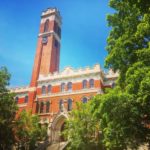3 Strong Boston University Essay Examples
Boston University is a top research university in the heart of the city. With a fairly low acceptance rate, admissions is pretty selective, and writing strong essays is essential to standing out. BU requires one essay for all applicants, and has an additional information prompt that is optional. Applicants to the Accelerated Program in Liberal Arts and Medicine have another essay, and Honors College applicants have two additional essays. In this post, we’ll then go over example essays from a real applicants, analyzing what they did well, and what could be improved. Please note: Looking at examples of real essays students have submitted to colleges can be very beneficial to get inspiration for your essays. You should never copy or plagiarize from these examples when writing your own essays. Colleges can tell when an essay isn’t genuine and will not view students favorably if they plagiarized. Read our BU essay breakdown to get a comprehensive overview of this year’s supplemental prompts. Prompt: What about being a student at Boston University most excites you? (250 words) I am most excited by Boston University’s Societal Engineer vision. As an aspiring engineer with a strong interest in government, I love that BU encourages engineering majors to strengthen their communication skills and global awareness. Academically speaking, I would explore political science courses through BU Hub requirements like Historical Consciousness and Ethical Reasoning. In addition, I would explore the world through the semester-abroad programs offered by BU for engineering majors. If admitted, I would love to study in Grenoble (and brush up on my French!) as a sophomore. Beyond academics, BU’s student groups also align with the Social Engineer vision. BU’s Engineers Without Borders mission spans both engineering and communication, as their project in Zambia involved both in developing sanitation systems and presenting posters on these systems to the community. Given my strong desire to help others through engineering, I would devote my time and energy to EWB’s projects at BU. I am also intrigued by BU’s political student groups, and I appreciate that BU’s student government offers students from all colleges leadership as Senators. I work closely with my high school’s administration as the vice president of our honor society and the overseer of student elections, and I would enjoy doing something similar at BU. At BU, I can see myself tinkering with Autodesk Inventor late into the night and petitioning legislatures to fix gerrymandered districts. Because BU’s Societal Engineer vision would encourage both my STEM and humanities interests, I am very excited about being a student at BU. This essay is a strong response that adequately conveys what the student hopes to obtain from an education from Boston University. The applicant begins with a straightforward statement that expresses their interests in engineering and government. I am most excited by Boston University’s Societal Engineer vision. As an aspiring engineer with a strong interest in government, I love that BU encourages engineering majors to strengthen their communication skills and global awareness. Establishing this cross-disciplinary interest immediately sets the candidate apart from other engineering majors and makes their response more unique. By mentioning the intersection of engineering and government, the candidate hits upon a rare niche that demonstrates a willingness to bridge two seemingly disparate subjects. The student also mentions a study abroad opportunity specific for those within their major. They mention a specific study abroad destination, which further underscores their interest in this offering. The inclusion about brushing up on their French establishes a personal connection to their location choice, which also strengthens this portion of the response. Next, the applicant discusses BU’s relevant extracurricular opportunities: Beyond academics, BU’s student groups also align with the Social Engineer vision. BU’s Engineers Without Borders mission spans both engineering and communication, as their project in Zambia involved both in developing sanitation systems and presenting posters on these systems to the community. Given my strong desire to help others through engineering, I would devote my time and energy to EWB’s projects at BU. This inclusion is a good example of taking a BU-specific offering and expanding on what specific project the author intends to work on. They do a good job of connecting an engineering-related club to their humanities-related passions. The applicant then concludes with the following: At BU, I can see myself tinkering with Autodesk Inventor late into the night and petitioning legislatures to fix gerrymandered districts. Because BU’s Societal Engineer vision would encourage both my STEM and humanities interests, I am very excited about being a student at BU. These final sentences do a nice job of wrapping up the response in a way that allows the essay to flow smoothly until the end. The mentions of Autodesk Inventor and petitions provide readers with specific details that corroborate the points made earlier in the response. The applicant ends with a forward-facing sentence that solidifies their desire to attend BU. Similarly, you should aim to wrap up your response with a final statement that encapsulates your essay thus far and also points ahead to your future at the university. This essay could be strengthened in that the candidate does not necessarily establish a personal connection to BU’s Societal Engineer vision. To improve this, they could briefly elaborate on what drew them to this academic intersection. Perhaps volunteering at a homeless shelter opened their eyes to housing inequalities, which stem from issues with both finding cheap building materials and their city’s budget. Or, perhaps their interest in creating sustainable plastic substitutes drew them to explore both materials engineering and environmental policy. This personal connection would strengthen the overall authenticity of this essay and provide a flow for admissions officers to follow. The next portion of this response could also be improved. It centers on BU’s academic opportunities: Academically speaking, I would explore political science courses through BU Hub requirements like Historical Consciousness and Ethical Reasoning. In addition, I would explore the world through the semester-abroad programs offered by BU for engineering majors. If admitted, I would love to study in Grenoble (and brush up on my French!) as a sophomore. The applicant demonstrates that they have researched their major and mention a specific requirement. This is a good start; however, they should elaborate more on why they chose to mention this specific category. They can talk about how they hope to learn more about specific courses within this category. For instance, maybe they want to learn about security in America to inform their sense of national politics, or delve into the representation of the Holocaust in film, as they feel current policies on religious diversity should consider this topic. This further elaboration will round out this portion of the response rather than leaving it underdeveloped. Prompt: What about the Kilachand Honors College resonates with you, and how would Kilachand’s curriculum fulfill your academic, creative, intellectual, and/or professional goals? (600 words) I am an example of societal rejection. My lack of adherence to gender constructs breaks traditional expectations as my queerness takes over any sense of “normality” that society could see in me. As a queer, nonbinary person of color and an Indian immigrant, I’ve moved away from expectations that demand a definition of my characteristics and have begun to explore who I am on a profound level. It’s this concept of exploration that I aspire to integrate into my education so that I can learn more about others and understand the incomprehensible by any means, whether it be through interacting with different aspects of humanity, connecting with new communities, or increasing my knowledge on a topic. I’ve found this same ring of curiosity and educational passion that distinguishes Kilachand Honors College and have come to resonate with it, whether it be through the different community based circle meetings, the dissimilar seminars focused on developing critical and creative thinking, or the focus on experiential learning. However, Kilachand takes this interest for learning one step further, adding another dimension to the challenging liberal education through building on layers of global, social, corporate, and geopolitical challenges within the classes. This interdisciplinary aspect of the Kilachand curriculum provides me with the chance to understand issues from different perspectives, which I’d take advantage of to fulfill my professional goal of directing a human rights campaign. Specific classes like KHC HC 401: Epistemologies and the Process of Inquiry and KHC HC 301: Interdisciplinary Perspectives on Global Challenges offer new intellectual opportunities I have been seeking while also supporting me in utilizing my education in a way that benefits my community. The emphasis placed on exploring the real life impact of students’ work in Kilachand’s integrated curriculum is empowering and would help me use education as a tool to build on my global perspective and make a meaningful difference. It is my goal to learn more about the unfamiliar so that I can apply that knowledge to “unsolvable global issues” that are only labeled as such because of a cultural disconnect or societal difference. Kilachand supports this goal through offering co-curricular events and residencies where I can connect with other cultures through visiting different cultural institutions or having enlightening discussions with leading professionals. I am inspired by the passion behind the Kilachand community; events such as the POC and LGBTQIA+ Circle meetings are features of the Kilachand community that I hope to contribute to and learn from. By learning about others’ experiences and sharing my own, I aspire to be a part of the intellectual curiosity that is shared among Kilachand students. The copious academic, cultural, and social opportunities at Kilchand all connect back to the same pillar of change that I have continuously been drawn to. Even though my interests are diverse and follow multiple tracks, the diversity of opportunities at Kilchand resonate with my varied passions and offer an accepting community connected through curiosity, which I hope to contribute to. The essay starts out with a bold, unexpected first sentence that hooks the audience into continuing to read the essay. This well-crafted writing seamlessly leads into an introduction about the writer, their values, and what they are looking for in a college education. The following paragraphs show how the Kilachand Honors College is an ideal fit for them. The key to writing any “Why This College?” essay is to highlight specific resources that the college offers. This essay does that well by mentioning a wide range of BU resources by name, including classes, the integrated curriculum, the interdisciplinary educational philosophy, and extracurricular activities. By directly stating that they want to take “specific classes like KHC HC 401: Epistemologies and the Process of Inquiry,” the writer shows that they have done thorough research into the Honors College. More than anything else, evidence of this research demonstrates interest in the offerings of the Honors College and a strong “why” for applying. The writer has not created a laundry list of resources with their essay either. They show that they have a personal interest in each resource by using “I” statements and explaining their ideas for making the most of the Honors College in the future. Instead of simply stating “I am looking forward to joining clubs related to social justice at BU,” the writer presents a much clearer and more confident vision for their academic future with the phrase “…events such as the POC and LGBTQIA+ Circle meetings are features of the Kilachand community that I hope to contribute to and learn from.” Though the essay is highly specific with the resources it mentions in most parts, several sentences in the second paragraph could be strengthened: However, Kilachand takes this interest for learning one step further, adding another dimension to the challenging liberal education through building on layers of global, social, corporate, and geopolitical challenges within the classes. This interdisciplinary aspect of the Kilachand curriculum provides me with the chance to understand issues from different perspectives… Many other colleges offer an interdisciplinary curriculum, so the writer should write additional details here about Kilachand’s “interdisciplinary aspect.” They should ask themselves, is there a specific university value which encourages professors to tie many academic disciplines together in the classroom? Does BU require Kilachand students to take an honors core curriculum that covers many areas? Answering these questions would add the right level of specificity to the writer’s point about Kilachand’s educational philosophy. The essay would also be stronger if the writer explained exactly how Kilachand fosters curiosity. If curiosity were a core value of the Honors College, the writer could clarify by changing part of the essay’s last sentence to “an accepting community connected through the value of curiosity.” Prompt: Describe a time when you felt out of your comfort zone or marginalized in a situation. How did you respond to that moment and how has it informed your actions moving forward? (600 words) “The last 10% is 90% of the work.” It was written on a small, ripped-off piece of yellow legal paper in fading blue ink. And now, it still sits in my desk drawer, four years after it was given to me by my band director, Mr. Laghari. It was one day in ninth grade, about two weeks before I was to perform my very first audition, that Mr. Laghari strolled over to where I was sitting. “Alright Kat, let’s hear this district piece!” What followed, looking back, was absolutely the most mediocre performance you’ve ever heard. “Well done! I have a few comments for you though. Mainly, it seems like you have the notes and rhythms down, but you gotta add some musicality!” I had no clue what he was talking about; it showed in my face. “Expression! Dynamics! You know!” But I didn’t. “Oh come on! It’s the last part, right before the audition, the hardest part. You know, my high school band director once told me…” He took out his yellow legal pad and began writing. “The. Last. Ten. Percent. Is. Ninety. Percent. Of. The. Work.” He ripped it off, and gave it to me. And I took it to heart. I looked up musicality, expression, dynamics, and worked to map out phrases in the music. I recorded myself to see what I could add to make it musical. When the audition came around, I was ready. When they called euphoniums, I enthusiastically left my school’s group and walked with the rest of the auditionees to the holding room. But it was a long walk. Not only did I start to miss the safety of my school group, I started to get in my own head. What if I put in all my hard work for nothing? What would people think? My parents? Mr. Laghari? In the holding room, I squirmed in my seat, waiting for my name to get called. The clock on the wall ticked and ticked, my anxiety building all the while. Finally, my name was called, second-to-last, and as I followed the volunteer to the audition room, I suddenly remembered Mr. Laghari’s slip of paper. I just needed to give my ninety percent. I focused myself, and did just that. So it came as a surprise to me when Mr. Laghari told me that I placed seventh, and they took the top six players, on the bus ride home. Not only was I surprised, I was crushed. “We’ll get ‘em next year!” he said. But all I heard was “You didn’t make it this year.” It was a bitter trip. It took me about a week to realize what he said, and that I would crush it next year. I told myself it wasn’t a matter of auditioning to see if I could make it. I told myself auditioning was a formality. And as I looked at the blue ink on that slip of paper, with all of those crushing memories now attached, I told myself that I would give my ninety percent not just on the last ten percent of the work, but on all of it: every year. And with that mindset, I’ve not only placed first in All-Districts on trombone and euphonium, but have made it all the way to All-State. So, whenever I need inspiration for a project, motivation to finish my homework, determination not to give up, I just open up my desk drawer. And one day in the near future, when I move off to Boston University, that slip of paper is what I’ll be taking with me. This essay is a moving example of how to tell a story with dialogue. Beginning the essay with dialogue is unexpected, which automatically makes for a gripping hook. At the same time, dialogue is an excellent way to organize the essay and convey main ideas in a succinct, yet creative way. The one-sentence introduction of the essay summarizes its entire message more effectively than a paragraph. The writer then shows how they felt out of their comfort zone and responded by focusing on several specific moments of their journey to become a better musician. Writing about a few parts of a story with vivid detail will result in stronger narrative than a more general, big picture account. Lastly, the essay is cohesive and moving because of its motif, or recurring theme, of Mr. Laghari’s slip of paper. This one detail ties the whole essay together from start to finish. The motif makes the essay flow well and stay on topic, which are among the greatest challenges for any college essay writer. Of course, the motif makes for an awe-inspiring concluding sentence as well! The writer could strengthen their essay by responding further to the last question of the prompt about how their moment of discomfort informed their actions moving forward. The writer certainly touches on this, but only talks about working harder as a musician and high school student. Adding a few more sentences to the second-to-last paragraph about their plans for the far future would answer the prompt more completely. For example, they could expand the final sentence of that paragraph to the following: And with that mindset, I’ve not only placed first in All-Districts on trombone and euphonium, but have made it all the way to All-State. I’m now inspired to put 100% into my dream of becoming a professional musician in a philharmonic orchestra. Do you want feedback on your BU essays? After rereading your essays countless times, it can be difficult to evaluate your writing objectively. That’s why we created our free Peer Essay Review tool, where you can get a free review of your essay from another student. You can also improve your own writing skills by reviewing other students’ essays. If you want a college admissions expert to review your essay, advisors on CollegeVine have helped students refine their writing and submit successful applications to top schools. In fact, Alexander Oddo, an essay expert on CollegeVine, provided commentary on the essays in this post. Find the right advisor for you to improve your chances of getting into your dream school!
Essay Example #1
What the Essay Did Well
What Could Be Improved
Essay Example #2
What the Essay Did Well
What Could Be Improved
Essay Example #3
What the Essay Did Well
What Could Be Improved
Where to Get Your BU Essays Edited





